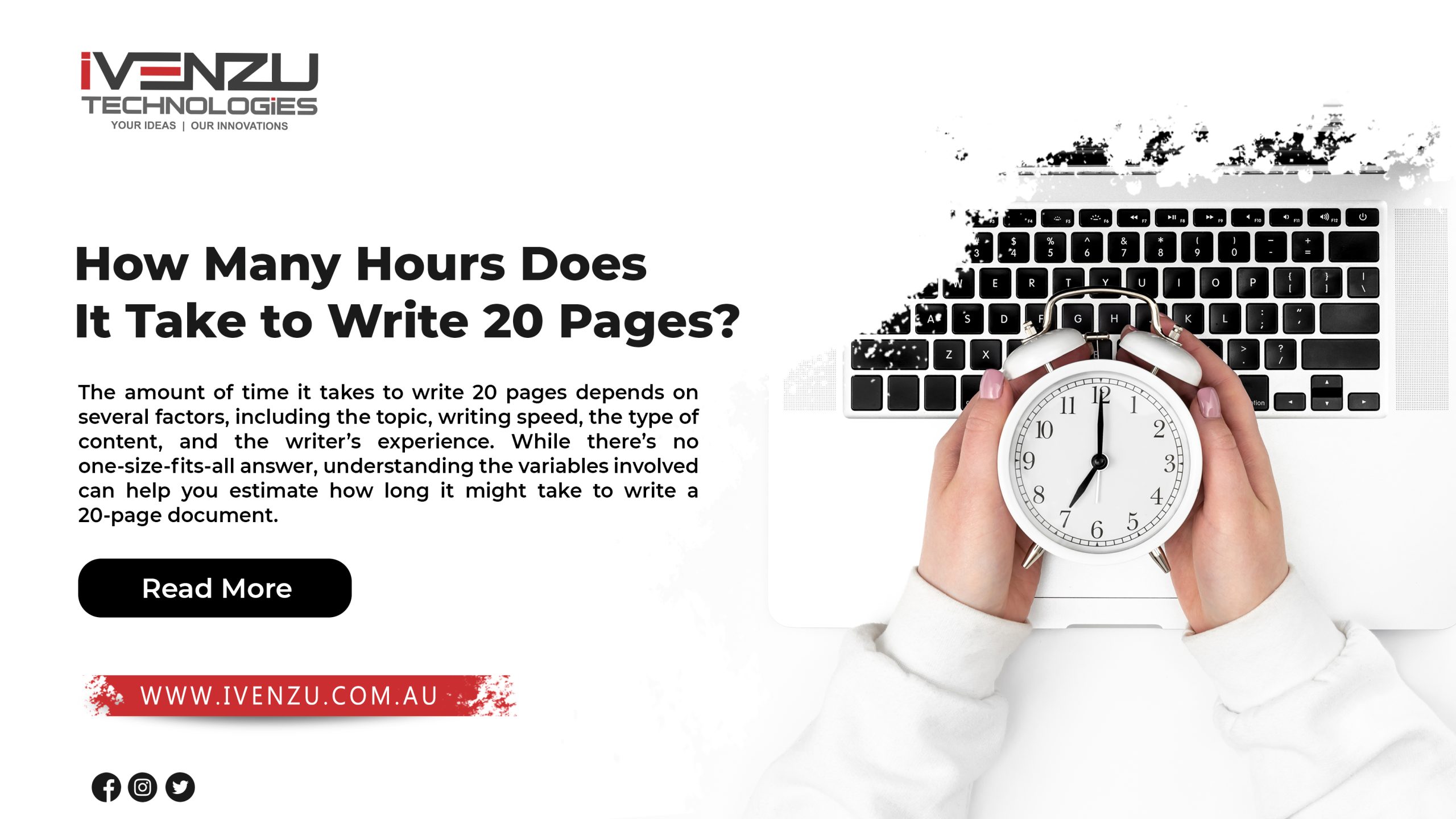How Many Hours Does It Take to Write 20 Pages?
The amount of time it takes to write 20 pages depends on several factors, including the topic, writing speed, the type of content, and the writer’s experience. While there’s no one-size-fits-all answer, understanding the variables involved can help you estimate how long it might take to write a 20-page document.

In this detailed guide, we’ll explore different scenarios that impact writing time, from academic essays and business reports to creative writing and content writing. By the end, you’ll have a clearer idea of how much time it could take to write 20 pages and how to plan accordingly.
1. Factors Affecting Writing Time
Several factors influence how long it will take to write a 20-page document. Some of the main factors include:
1.1 Writing Speed
Writing speed can vary widely depending on experience and the complexity of the topic. On average, people write between 500 to 1,000 words per hour. This can fluctuate based on the writer’s familiarity with the topic, how much research is required, and how many drafts need to be completed.
-
- Fast Writers: Writers with high fluency, experience, or familiarity with the topic may write faster, often completing 1,000 words per hour or more.
- Average Writers: Writing 500 to 750 words per hour is a typical pace for most people.
- Slow Writers: Writers who take extra time to perfect their work, do heavy research, or craft highly detailed writing may average 300 to 500 words per hour.
1.2 Content Type
The type of written content plays a significant role in determining how long it will take to complete the task. Different types of writing require varying research, planning, and editing. Here’s a breakdown:
-
- Academic Essays or Research Papers: These require in-depth research, sourcing citations, and often multiple drafts. They can take longer because accuracy, referencing, and detailed argumentation are needed.
- Business Reports or Proposals: These are usually structured and require a lot of data gathering and analysis, making them time-consuming.
- Creative Writing: Writing fiction, poetry, or scripts can vary greatly depending on the complexity of the plot, character development, and the writer’s flow. These can take more or less time, depending on the writer’s approach.
- Blog Posts or Website Content: Content for websites or blogs tends to be quicker to write, especially if it’s less formal and doesn’t require extensive research.
1.3 Topic Familiarity
Writers who are highly familiar with a topic will spend less time on research, resulting in faster writing. Conversely, if the writer is unfamiliar with the subject, additional time will be spent researching, outlining, and possibly revising.
1.4 Research
The amount of research needed also influences writing time. For example:
-
- No Research: It may take less time if you’re writing about a topic you already know.
- Light Research: It can be completed relatively quickly if only a little research is required (such as fact-checking or adding statistics).
- Heavy Research: Topics that require deep analysis or sourcing references may add significant time to the writing process. Research can take a few hours to several days depending on the depth.
1.5 Rewriting and Editing
The process of revising, rewriting, and editing can be time-consuming, especially if multiple drafts are necessary. Editing for clarity, grammar, punctuation, and structure can add substantial time to the total process. Writers typically spend about 1-2 hours editing for every hour of writing.
2. Estimates Based on Writing Speed and Content-Type
2.1 Fast Writers (1,000 words per hour)
If you are a fast writer and can produce about 1,000 words per hour, here’s an estimate for writing 20 pages of text:
-
- Word Count: 20 pages of text are typically around 5,000 words, assuming an average of 250 words per page.
- Writing Time: If you can write 1,000 words per hour, it will take you approximately 5 hours to write 20 pages of content.
- Research and Editing: Assuming a moderate amount of research and editing, an additional 2–4 hours might be needed for revisions and fact-checking.
Total Time: 7–9 hours (for fast writers).
2.2 Average Writers (500–750 words per hour)
For most people, a more realistic average writing speed is between 500 and 750 words per hour. Here’s an estimate:
- Writing Time: At 500 words per hour, writing 5,000 words will take you around 10 hours. If you write at 750 words per hour, this time is reduced to about 7 hours.
- Research and Editing: Research and editing could add 4–6 hours, depending on the complexity of the content.
Total Time: 14–16 hours (for average writers).
2.3 Slow Writers (300–500 words per hour)
For slower writers or those writing very detailed, high-quality content, getting words down on paper may take longer. Here is the breakdown:
- Writing Time: At 300 words per hour, writing 5,000 words will take you 16.5 hours. At 500 words per hour, the time would be reduced to 10 hours.
- Research and Editing: This type of writing will likely need more revision, and research can take 6–8 hours.
Total Time: 22–24 hours (for slow writers).
3. Additional Considerations
3.1 Outlining
If you spend time outlining your content before starting, it can help you write more efficiently and reduce overall writing time. An outline may take a couple of hours but could save you time later when organizing your thoughts and ideas.
3.2 Distractions
If you work in a distracting environment or only write in short bursts, your writing time may increase significantly. Ensuring a focused, quiet workspace can help speed up the process.
3.3 Tools and Technology
Writing tools like Grammarly for grammar checks, writing assistants, or dictation software can streamline the writing process. Additionally, research tools like Google Scholar or Zotero can help gather information faster.
3.4 Rest and Breaks
Taking regular breaks is important to maintain focus and prevent burnout. Your productivity may drop if you write for long stretches without a break. Consider working in blocks of 90 minutes with short breaks in between to keep the quality of work high.
Writing 20 pages of content can take anywhere from 7 hours to 24 hours, depending on your writing speed, topic, and whether you need to conduct research. Fast writers can complete the task in about 7–9 hours, while slower writers may require 22–24 hours. Additional time will also be needed for research, outlining, and editing, especially if the content is complex or requires citations.
By understanding your writing speed and planning your work in manageable chunks, you can ensure that you complete your 20-page document efficiently without sacrificing quality.
Your questions and answered
How long does it take to write 20 pages?
The time varies based on writing speed, topic complexity, and research needed. On average, it can take 7 to 24 hours to complete 20 pages.
How many words are in 20 pages of writing?
A standard double-spaced page contains approximately 250 words, so 20 pages equal about 5,000 words.
How fast can a professional writer complete 20 pages?
A fast, experienced writer may complete 20 pages in 7–9 hours, including editing and light research.
What factors affect how long it takes to write 20 pages?
Key factors include:
- Writing speed
- Familiarity with the topic
- Research depth
- Content type (e.g., blog, academic, report)
- Editing and revisions
Can I write 20 pages in one day?
Yes, it’s possible with focus and planning. Break your time into writing blocks with short breaks and use tools like Grammarly or AI assistants to speed up the process.
How do I plan my time for writing 20 pages?
Start with outlining, allocate time for research, writing, and editing. Use the Pomodoro technique or 90-minute work blocks to maintain productivity.
Do I need to edit after writing 20 pages?
Absolutely. Editing can take 1–2 hours per draft and is crucial for clarity, grammar, and structure.
More Latest Blog
Best AI Tools for Freelancers and Entrepreneurs in 2026 If you’re a freelancer or small business owner, 2026 is the year AI stops...
Comet Browser (AI Browser) The web is overflowing with tabs, logins, content, and chores. You open one article, then twenty more, copy...
What is a Software Service Company? A software service company is an organization that provides clients with specialized...
What is Quantum Computing and Why We Should Know? Quantum computing is an emerging technology that leverages the principles of quantum...




